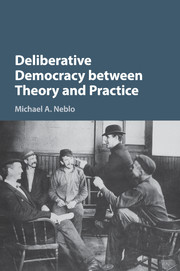Book contents
- Half title page
- Title page
- Copyright page
- Dedication
- Dedication
- Contents
- Contents
- Contents
- Book part
- 1 Introduction: Common Voices
- 2 Form Follows Function
- 3 Framing the Public: Do Citizens Have “Real” Preferences?
- 4 How Deliberation Counts: Talking, Voting, and Strategy in Democratic Choice
- 5 Who Wants to Deliberate?
- 6 A Few Days of Democracy Camp
- 7 Conclusion: A Preface to Deliberative Democratic Theory
- Bibliography
- Index
- References
Bibliography
Published online by Cambridge University Press: 05 November 2015
- Half title page
- Title page
- Copyright page
- Dedication
- Dedication
- Contents
- Contents
- Contents
- Book part
- 1 Introduction: Common Voices
- 2 Form Follows Function
- 3 Framing the Public: Do Citizens Have “Real” Preferences?
- 4 How Deliberation Counts: Talking, Voting, and Strategy in Democratic Choice
- 5 Who Wants to Deliberate?
- 6 A Few Days of Democracy Camp
- 7 Conclusion: A Preface to Deliberative Democratic Theory
- Bibliography
- Index
- References
- Type
- Chapter
- Information
- Deliberative Democracy between Theory and Practice , pp. 201 - 210Publisher: Cambridge University PressPrint publication year: 2015



